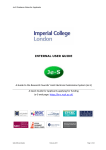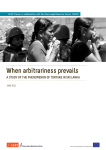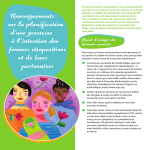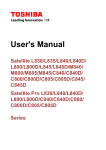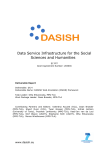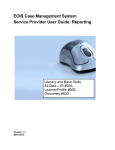Download KTP User Guide to the Submission of an Expression of Interest
Transcript
KTP User Guide to the Submission of an Expression of Interest May 2010 Version 1 A guide to help users understand the requirements of the new Expression of Interest (EOI) process which should be read prior to completion of the MS Word version of the form. 1 KTP GUIDANCE NOTES FOR EXPRESSION OF INTEREST (EOI) SUBMISSION PROCESS 1. General Introduction The objectives of Knowledge Transfer Partnerships are to: Facilitate the transfer of knowledge and the spread of technical and business skills; Provide business -based training for graduates1 in order to enhance their commercial and specialist skills; Stimulate and enhance business relevant research and teaching undertaken by the knowledge base. Purpose of the form The purpose of the EOI is to enable the Partnership to provide information sufficient to describe what is to be carried out and avoid unnecessary effort in working up the grant application and proposal form. The information provided is considered the minimum required to enable the KTP Adviser to be able to assess and decide quickly if KTP is the right approach to be taken and where necessary offer alternative solutions to meet the needs of the business. The KTP Adviser will also make an initial assessment of a business’s financial viability, identify and map potential projects to suitable Funding Organisations and may use the EOI to seek the views and receive feedback from other Advisers. Provided the Adviser is in agreement the full grant application and proposal form may be developed in parallel with the EOI. Funding Organisations will use the EOI to gauge the project numbers in the pipeline, allocate funding against its specific criteria and maximise available funding, where possible, by sharing of support with another Funding Organisation. The EOI therefore provides Funding Organisations with the opportunity to comment on specific areas they want included in the full proposal or other areas for the Partnership to consider, adding value at the early development stage. The EOI should lead naturally to the development of the full proposal where the Partnership sets out why and how the project will be delivered. Process You will find it helpful to contact your KTP Adviser and discuss the proposed project before attempting to complete your EOI. The EOI does not replace the need for early discussions between a potential Partnership. The project must meet the overarching criteria for all KTPs. 1 For the purposes of being a KTP Associate, a ‘graduate’ may be a person recently qualified with a first or higher degree, a Scottish/National Vocational Qualification (S/NVQ) Level 4 or a Higher National Certificate, a Higher National Diploma (HNC/HND) or a Foundation Degree. . 2 The Adviser is required to make a visit to the business organisation before the EOI may be formally submitted for consideration via the KTP portal, as this will enable key requirements and issues to be identified at the earliest opportunity. A complete list of KTP Advisers can be found at www.ktponline.org.uk. A Knowledge Transfer Partnership EOI is to be submitted for all new potential Knowledge Transfer Partnerships. Once completed the EOI should be sent by email to your KTP Adviser for consideration. The KTP Adviser may recommend that a further review is necessary to establish if the proposed project meets the overarching criteria for every KTP and that a suitable funding organisation can be identified. http://www.ktponline.org.uk/strategy/sponsorshipCriteria.aspx Only when the Adviser is satisfied, will the EOI, together with any other supporting information, be formally submitted to the KTP Programme Office using the online Portal submission and assessment process. The KTP Adviser also has the opportunity to ask other KTP Advisers to review an EOI if the ability of the company partner to fully exploit the outcomes of the project, and afford its share of the projects costs, are unclear. The KTP Adviser will provide the Partnership with their feedback on the EOI and will advise as to whether the Partnership should submit a full grant application and proposal form. Please note that submission of an EOI, or a full grant application and proposal, does not guarantee the awarding of a KTP grant to Partnerships. Completing and Submitting your EOI It is important that all the questions are completed on behalf of both Partners. They should result from jointly developed and agreed plans that meet realistic and ambitious objectives for both Partners and provide a demanding development and training experience for the KTP Associate(s). The EOI must be completed in at least 10-point size, preferably using Arial. Please do not leave any blank spaces. If a question does not apply to you, put ‘N/A’. Having completed the EOI a copy of the original should be e-mailed to the KTP Adviser who advised on its preparation. This copy will be reviewed by potential Funding Organisations. An EOI may be submitted at any time. 3 Glossary of terms Partnership The relationship between the business/organisation and UK knowledge base organisation. Project An individual project between the business and knowledge base organisation using an Associate. A partnership can include more than one project and therefore, more than one Associate. Data Protection We will process the information provided in proposals and applications in accordance with the principles set out in the Data Protection Act. The data controller is the Technology Strategy Board (TSB). The information provided, including any supplementary information that may be provided at a later date, will be used for the following purposes: Processing and assessing the proposal and application for grant by the KTP Programme Office for the TSB and the public sector organisations that are funding Knowledge Transfer Partnerships; Statistical and performance reporting by the TSB and the public sector organisations that are funding Knowledge Transfer Partnerships (this will not result in the publication of any information that would enable any organisation, company, institution or individual to be identified); Publishing contact information relating to knowledge base organisations, businesses and individuals participating in Knowledge Transfer Partnerships, descriptions of the aims of the Knowledge Transfer Partnership, the type and size of business involved and the amount of grant offered; and Providing the contact information referred to above to public sector supported business support organisations, for example Business Link Operators or equivalent, who may contact you in order to offer other appropriate services. Apart from these purposes, information provided in Knowledge Transfer Partnership proposals and grant applications will not be revealed to any other organisation for any purpose other than detecting or preventing fraud. You have the right to request a copy of the information held about you at any time. If you wish to do this you should write to: The Data Protection Act Officer Technology Strategy Board North Star House North Star Avenue Swindon SN2 1JF 4 EOI Process Flow Diagram (see notes below) Do you support this EOI? NO EOI Not supported Notify Knowledge Base YES Do you require additional input? NO From 2nd Adviser? From 3rd Adviser? YES Feedback provided including if and when to submit full proposal Submit on-line and Select FOs YES Are FO comments required ? From Regional Group? YES YES Does the FO require additional information? Adviser supplies information from Partners YES NO NO Does the FO require copy of full proposal Do you require more than one FO? Yes NO NO Does the Programme Office agree with choice of FO(s)? FO takes a decision and provides final feedback YES Adviser adds final feedback and notifies Partnership 5 Programme Office sends copy to FO 2. EOI Process Flow Diagram Explanatory Notes 2.1 Partnerships sends the EOI by email to their nominated KTP Adviser for consideration. The Adviser records the EOI on the Portal, with the EOI being added as an MS Word attachment. Advisers may take the opportunity to send it to a colleague’ or group of colleagues for comment before deciding whether it should be supported. 2.2 EOIs are reviewed by the Programme Office who consider the choice of Funding Organisations made by the Adviser. They decide if that choice is appropriate. If there is a difference of opinion over the Funding Organisations selected then this is communicated to the Adviser by the Programme Office until the issue is resolved. 2.3 Where it is required, the appropriate EOI is sent to the Funding Organisations for comment/consideration. 2.4 Funding Organisations have the opportunity to ask for additional information before making a decision on whether or not to support an EOI. Funding Organisations’ comments and/or decisions are automatically communicated to the relevant Adviser. Provided in the Advisers judgement, there is at least one potential Funding Organisation identified as being able to fund the whole project, the Partnership may commence the development of a full Proposal. 2.5 In the unlikely event that the online system should fail, then Advisers and Funding Organisations should revert to the use of the previous email system. 6 3. Responsibilities of KTP Offices and Partnerships 3.1 The KTP Centre/Office should set its own criteria for determining which EOIs should be developed, and when they should be submitted to the nominated KTP Adviser for consideration. It is suggested that this criteria include strategic value to regional economic development and to the mission of the university/college, and the challenge posed to participants and the level of innovation represented by the proposed project. Partnerships should help companies and other organisations address important technological, commercial and social problems and opportunities so that they (and possibly related companies) make significant improvements in their competitiveness. It is equally important that the participating Academics are extended and, through KTP, able to keep up to date with the latest business requirements as well as becoming skilled in the industrial applications of new ideas. Also, it is important that the work content is intellectually challenging for Associates and provides opportunities for their professional development. It is imperative that real knowledge transfer occurs, such that knowledge, technology or skills gaps within the company are filled. 3.2 Partnerships must enter into early discussions with the nominated KTP Adviser to agree the next steps needed to develop the EOI and what solution meets the needs of a business. These early discussions must be used to help support the work of KTP Offices and Advisers and are only part of the toolkit used by all parties to establish what support can be provided to meet the needs of a business/organisation. It is not intended to replace all the preparatory work such as best practice workshops, visits and discussion that already take place, but is designed to focus attention on key information requirements. 3.3 EOIs may be submitted at any time provided it is with the agreement of the KTP Adviser. However, Partnerships must be made aware that EOIs may have to be sent to others for consideration before the KTP Adviser is able to give the ‘go ahead’ for the development of a full Proposal. Reasons may include: The Adviser requires expert advice from another KTP Adviser/Regional Group colleague, for example, regarding financial issues etc. There may appear to be duplication with another or previous KTP project (eg. In the public Sector) Only with the full agreement of the KTP Adviser may an EOI and full grant application and proposal form be developed in parallel. 3.4 The KTP Office staff must agree with their nominated KTP Adviser a realistic timetable for the whole of the KTP Proposal submission process, to ensure that sufficient headroom is maintained to plan, prepare, develop and submit an EOI and any subsequent full Proposal. 3.5 Part of the EOI process requires that the Partnership identify all possible Funding Organisations whose criteria matches the objectives of the proposed Partnership and which would support the type of business/organisation identified as a Company Partner. KTP Offices must make themselves familiar with the latest criteria set by all the Funding Organisations, which may be amended from time to time but which can only be found at: http://www.ktponline.org.uk/strategy/sponsorshipCriteria.aspx 3.6 KTP Office staff must make Partnerships aware that Funding Organisations may raise supplementary questions, that need to be addressed as this can sometimes be a key 7 opportunity for the Funding Organisation to add further value to what is being proposed, by clarifying issues and adding tasks. 3.7 Partnerships must take account of comments raised by Funding Organisations and are required to address any issues during the development of any full Proposal wherever possible. Where a Funding Organisation requests sight of the full grant application and proposal form, issues may be raised that have to be considered by PAG. These will have to be addressed by the Partnership either in the form of an amendment or be addressed following the release of the grant offer letter. 3.8 It is particularly important for Partnerships and KTP Office staff to realise that, provided they follow closely the advice provided in this document, the chances of the full Proposal being rejected during the submission process by either the KTP Adviser or the KTP Programme Office staff, for procedural reasons, will be substantially reduced. 4. Responsibilities of KTP Advisers 4.1 The KTP Adviser’s role in assessing the suitability of Proposals remains unchanged. They have the responsibility of managing the pipeline process and providing feedback to Partnerships. KTP Advisers have responsibility for considering EOIs received from their nominated institutions, They have responsibility for deciding if it is appropriate that the EOI should be revisited. The information about previous KTP EOI activity is available to Advisers in the Portal History. Advisers are also required to establish what other KTP activity within the company is being planned or may have been undertaken in the past. 4.2 On receipt of an EOI the KTP Adviser must assess its suitability and decide whether to support its progress through the Portal system or to reject it. The KTP Adviser will decide when it is most appropriate to visit the Company Partner, but the visit must take place prior to making their endorsement of support or rejection of the EOI. All EOI Proposals which are rejected must also be logged on to the Portal system as this enables other Advisers and Funding Organisations to identify whether it has been rejected previously and, if so, the reasons for it. 4.3 The KTP Adviser must also consider which Funding Organisation’s criteria match the EOI. The Adviser must at the very minimum be able to identify TSB as being able to support the project before agreeing that the Partnership begins to develop the full grant application and proposal form. At this stage it may not be possible for the Adviser to make a decision regarding support for the EOI because: The Adviser needs to seek advice from expert colleagues on technical or financial issues etc. It is unclear if there is Funding Organisations support for the EOI. 4.4 The KTP Advisers are responsible for ensuring that where Funding Organisations have provided feedback, this feedback is reflected in the development of any full Proposal or taken in to account when responding to issues raised by PAG. 4.5 The KTP Adviser is not permitted to contact the Funding Organisation representative directly without prior agreement from the Programme Office. 4.6 Once the full proposal is submitted the Adviser must confirm in their Adviser Recommendation that they support the company’s ability to fund the Partnership and its implementation, giving clear, factual reasons supported by data where necessary. The 8 Adviser must also explain why a particular Funding Organisation has been selected, with direct reference to its published criteria. They must also comment on the project duration and why they support it. 5. Responsibilities of the KTP Programme Office 5.1 The KTP Programme Office will not acknowledge receipt of EOIs. The use of the online Portal provides this information to the Adviser automatically. The KTP Programme Office will continue to review the choices of possible Funding Organisations selected by the KTP Adviser and confirm whether or not these are correct. In the event of a disagreement over the choice of Funding Organisations, the Programme Office will seek advice from the KTP Programme Director or individual Funding Organisations as appropriate. The KTP Adviser concerned will be contacted in order to reach an agreed resolution. The online Portal process is used to request that the Adviser revisits this question. 5.2 Martin Webb is available to undertake preliminary pre-EOI discussions with KTP Advisers and Offices, especially where project ideas ‘push the criteria envelop’ or ‘break new ground’. 5.3 The Programme Office has responsibility for communicating with Funding Organisations and will chase them for a response to EOIs, if necessary. The current practice is not to chase for a response to an EOI for the first two weeks after submission to the Programme Office. 5.4 The Programme Office will send copies of the full proposal to a Funding Organisation on request. These proposals will be posted to the Funding Organisation User area of the portal and alerts will be sent to out to request it be reviewed. 5.5 The Programme Office will, on receipt of a full Proposal, check that it has been through the EOI process, that it has received support from at least one Funding Organisation. 5.6 The Regional Group and PAG members will be provided with a ‘Summary’ of each EOI to accompany each full Proposal submission. The PAG Summary is available in pdf format from the Portal. The KTP Advisers are notified by email when the PAG Papers have been posted to the Portal. 6. Responsibility of Funding Organisations 6.1 Individual Funding Organisations will maintain up-to-date criteria for the support of KTP Partnerships and will advise the lead Funding Organisation and the Programme Office of any changes as they occur. The most up-to-date criteria are made available on the public area of the website only at: http://www.ktponline.org.uk/strategy/sponsorshipCriteria.aspx 6.2 Funding Organisations should post any requests for further information on the EOI and record final decisions by making use of the Portal only. This information, once posted, is immediately available to the KTP Advisers who then provide feedback to the Partnership. Funding Organisations are encouraged to respond within two weeks of receiving an EOI for consideration. 9 6.3 On receipt of the EOI the Funding Organisation is encouraged to make a decision based only on the information contained within the form. It can however, in exceptional circumstances request to receive a copy of the full proposal. Such a request is made within the online Portal process and if selected, automatically alerts the Programme Office to the requirement. Under these circumstances the TSB has requested that the Funding Organisation review the full proposal and respond online before the scheduled PAG meeting date. 6.4 Full grant application and proposal forms normally arrive in the Programme Office just before the set deadline (PAG Closing Date) and this means that the time available for Funding Organisations to review them may be limited. It is likely that Funding Organisation will have approximately one week to review and provide a response; otherwise PAG will not be able to review the responses/feedback on the day of the meeting. Reaching a quick decision before the meeting will help to minimise the requirement to undertake unnecessary post PAG activity. 6.5 Funding Organisations are requests to provide feedback using the on-line Portal process only. Little change has been made from the previous outline proposal process. 6.6 Funding Organisations are requested to notify the KTP Programme Office of staff changes where they have responsibility for providing feedback and comment on EOIs. Support and guidance on making the best use of the Portal is available from the KTP Portal Manager at any time. 7. Selecting a Funding Organisation 7.1 The Adviser has responsibility to select all possible and appropriate Funding Organisations at the EOI stage as this gives the minor Funding Organisations the opportunity to consider the EOI and provide feedback to the Partnership, hopefully at the same time adding value and making suggestions for improvement/additions whilst a full Proposal is being developed. This also provides the opportunity to meet the requirements of the TSB by maximising the expenditure from all Funding Organisations’ budgets throughout the year and also provides a much better understanding of what is in the pipeline. The following table of information should be taken into account when considering whether a Funding Organisation should be sent the EOI. Serial 1 2 Funding Organisations Technology Strategy Board (TSB) Devolved Administrations Comments EOIs do not have to be sent to the TSB for consideration unless support is in doubt. The KTP Adviser may make a decision on TSBs behalf. The TSB may be prepared to support projects that involve a publicly funded organisation, in particular, where the transfer of knowledge includes the improvement of operational management and planning. EOIs always have to be sent to InvestNI for comment/consideration. EOIs do not always have to be sent to SG unless it is unclear if the EOI Proposal meets their criteria. Where the EOI clearly meets criteria then PAG and the TSB representative present at the meeting will continue to make decisions on their behalf. EOIs considered suitable for WAG funding must always be sent to them for consideration. 10 3 AHRC TSB does not have delegated authority to make decisions on AHRC’s behalf. Therefore, all EOIs meeting its criteria must be sent to AHRC for consideration. 4 BBSRC The Funding Organisation must be sent all EOIs for review. 5 Defra The Funding Organisation must be sent all EOIs that appear to meet its criteria. The PAG does not make decisions on its behalf. The Funding Organisation is keen to see environmental sustainability issues being addressed in the EOI 6 DH 7 RDAs 8 STFC and NERC 9 EPSRC and KTA wef April 2009 10 ESRC If the EOI requires support from DH then the EOI must be sent firstly to DH for consideration. The PAG does not have delegated authority to make decisions on behalf of DH. EOIs must be sent to all RDAs for consideration. Please review individual RDA Criteria which is available on the website only. The Funding Organisations have agreed that the TSB can make decisions on their behalf. However, in the interests of maximising individual Funding Organisation’s expenditure it is preferred to send EOIs to them for consideration. Where a Knowledge Base Institution has a EPSRC Knowledge Transfer Accounts (KTA) the KTP Adviser should indicate on the EOI to what extent they are prepared to use this funding to support an EOI. The KTP Adviser and Offices are expected to ensure that discussions take place with account holders at the earliest opportunity. EPSRC has an alternative funding stream which may only be accessed by KBs not holding its own KTA. Care must be taken to show linkages back to previous EPSRC Research support. The Funding Organisation must be sent all Outlines that appear to meet its criteria. PAG does not make decisions on its behalf. The Funding Organisation is keen to see where cultural and social issues are being addressed. ESRC is not keen to support activity which has previously been supported elsewhere. Potential projects from ESRC Cluster activity still require to be sent to ESRC for consideration and should be shared with TSB funding. 11












